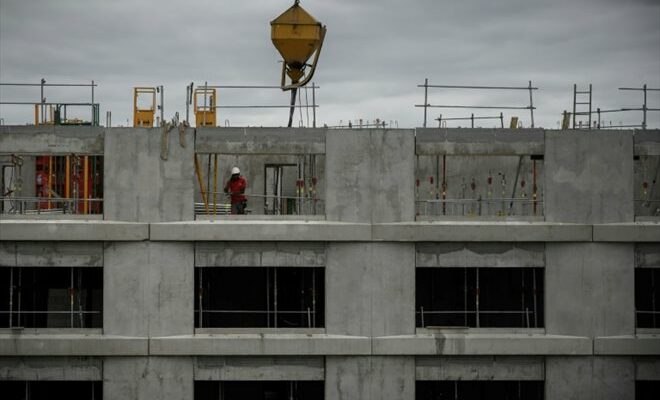A residential building under construction in Bordeaux, June 15, 2023 (AFP/Archives/Philippe LOPEZ)
The issuance of building permits, one of the barometers of new construction, fell in 2023 in France, a trend which leaves little hope for the real estate sector to quickly emerge from the crisis, despite the Prime Minister’s announcements on Tuesday.
According to provisional figures published by the Ministry of Ecological Transition, the number of building permit authorizations stood at 373,100 last year, down 23.7% compared to 2022.
The only small ray of sunshine in the bleak landscape of construction statistics, the month of December resulted in a 12% increase in permits issued compared to November, to 33,700, driven by the increase in collective and residential housing. (students, seniors, etc.).
But 115,900 fewer permits were issued over the whole of 2023 and all regions are affected by this downward trend.
“The figure for the month of December is good news but is not significant. We continue to see that it continues to decline and that it is not going to start again,” responded to AFP Pascal Boulanger, the president of the Federation of Real Estate Developers (FPI).
“Even we developers are filing fewer and fewer building permits because we are first trying to sell off the stock of what we have in production, as we sell much more slowly,” he said. added.
To tackle the crisis, Prime Minister Gabriel Attal proposed on Tuesday a “supply shock” aimed at “massively simplifying standards”, “facilitating densification” but also “accelerating procedures”, particularly in “twenty territories” where 30,000 housing units will be built in three years.
“There is no real desire to make housing a priority,” however reacted Loïc Cantin, president of the National Real Estate Federation (Fnaim), believing that the government “does not have a road map clear or concrete means”.
– “All-time lows” –
The poor performance of new construction also affects the number of construction starts, which traditionally follows that of permits by a few months and fell by 22% over one year, the ministry said, with 287,100 housing units.
As for permits, this indicator also recovered in December (+22%) compared to November, with 26,900 housing units.
“The market is falling back close to its historic lows of 1992-1993 (275,000 construction starts),” warned the French Building Federation (FFB) in December, predicting a recession of 5% in 2024.
“We are sliding towards the dangerous slope of non-delivery of housing for the needs of the French population,” its president Olivier Salleron told AFP on Tuesday.
“If the trend continues, which it will, we will build less than 250,000 housing units at the end of 2024, which is half what is needed. We are widening the deficit from year to year,” he added.
Over the whole of 2023, building permits issued for houses fell by 29%. The same goes for house starts (-25.2%), with 121,200 housing units started, “the lowest level recorded since 2000”, according to the ministry.
Permits issued for collective or residential housing also fell by 20.2% over one year, as did construction starts (-19.5%).
These figures relate to the record number of permits issued in 2022 after an influx of permit requests at the end of 2021, and before the entry into force of more ambitious environmental regulations (RE2020) for new construction.
But since August 2022, the number of permits issued each month has stabilized at only 30,000 per month.
These statistics above all reflect a deep crisis in construction as in the entire housing sector, due to a fall in demand linked to the drastic tightening of borrowing conditions, the disinterest of investors in rental investment, considered less profitable, but also the increase in construction costs and land prices.
© 2024 AFP
Did you like this article ? Share it with your friends using the buttons below.




